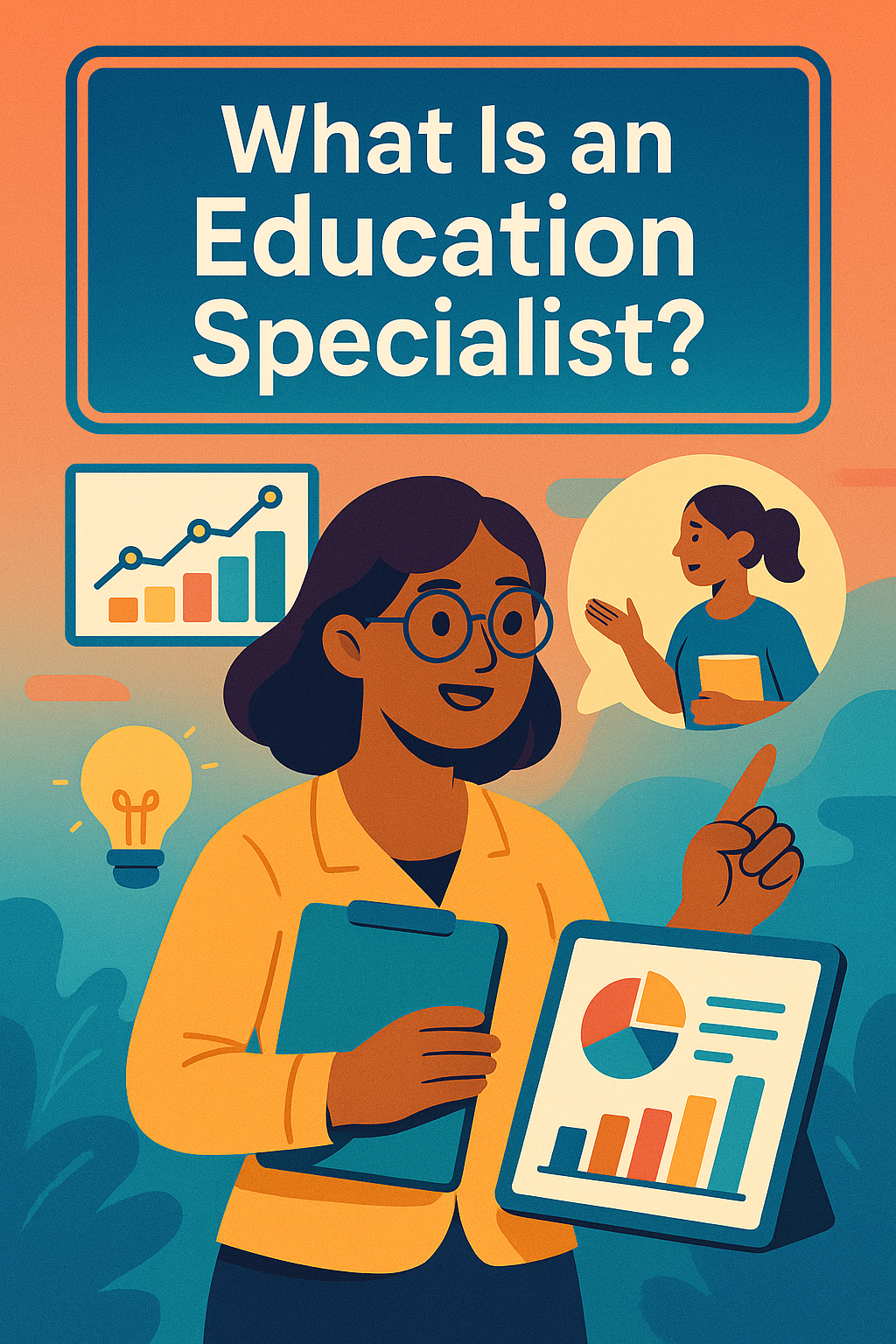Considering a career beyond teaching? Education specialists are the often-overlooked professionals who power student success from behind the scenes. They don’t run classrooms day-to-day, nor do they serve as principals—but they shape how teaching happens, how learning is measured, and how schools adapt to meet diverse student needs.
At its core, an education specialist is a highly trained instructional expert who supports curriculum design, student services, special education programs, teacher development, and systemic improvements across K–12 or postsecondary institutions. They work in roles like:
- Instructional coach
- Literacy or reading specialist
- Special education consultant
- School psychologist
- Curriculum and assessment coordinator
- EdTech integration leader
While many specialists hold a post-master’s credential called an Education Specialist degree (Ed.S.), others earn this title through certification and focused experience. These professionals serve as a bridge between classroom instruction and school-wide improvement—applying research, data, and pedagogy to solve real-world challenges.
They’re not administrators, but they’re not just teachers either. They operate in a hybrid space—supporting both roles, and influencing school culture, student outcomes, and instructional quality at scale.
Whether you’re a burned-out teacher seeking new impact, a career changer from psychology or counseling, or a district looking to elevate your support systems—understanding what an education specialist is could be your next strategic move.
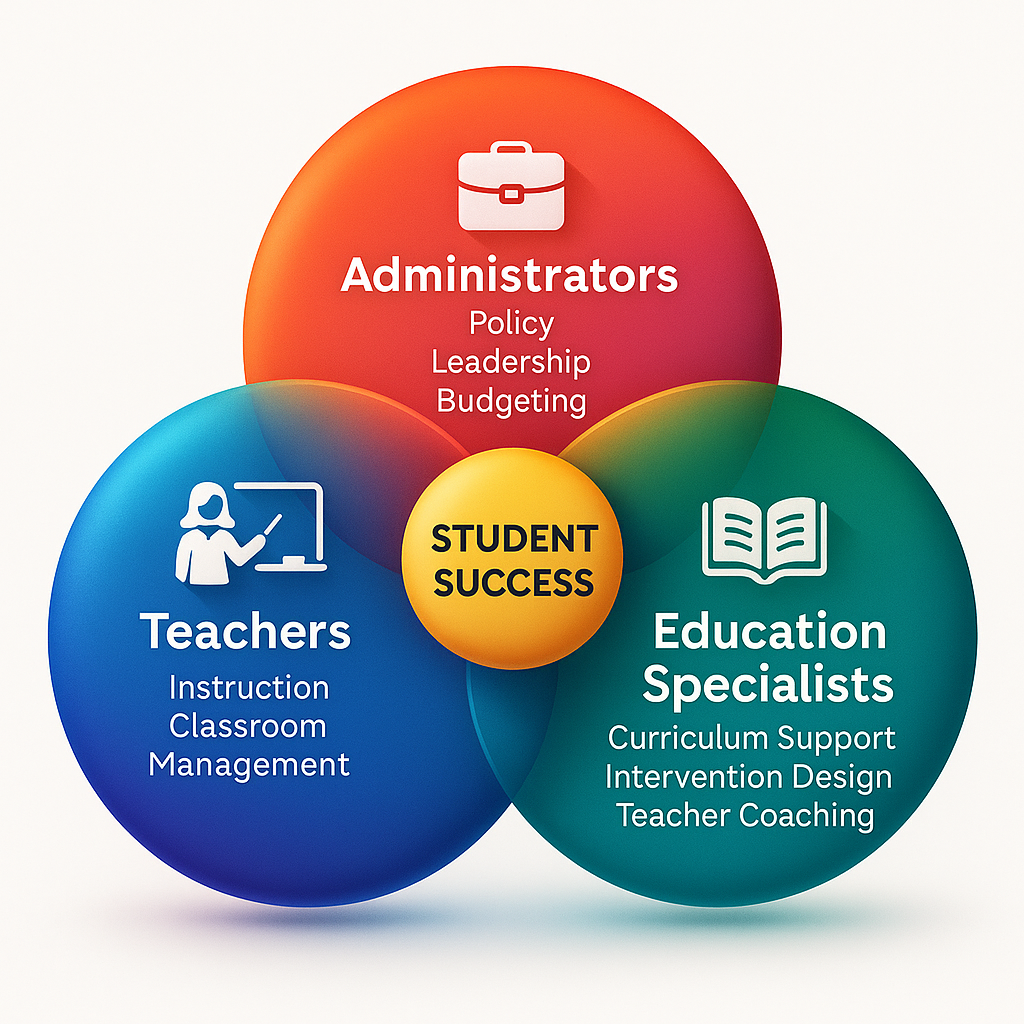
Defining the Role: What Exactly Is an Education Specialist?
Education specialists occupy a unique professional space within the education system—both as a job title and an academic credential.
In many U.S. school systems, the term “Education Specialist” refers to two distinct but connected ideas:
- A role within a school, district, or educational organization that focuses on a specific area of expertise (like curriculum development, special education, or instructional coaching).
- A post-master’s degree—commonly abbreviated as Ed.S.—that provides advanced preparation beyond a Master of Education (M.Ed.), but typically stops short of a doctoral degree.
In other words, an “education specialist” can be someone with a specialized job or someone who holds an Ed.S. degree—or both.
Understanding the Ed.S. Degree vs. M.Ed. and Ph.D.
The Education Specialist (Ed.S.) degree was created for educators who want to go beyond a master’s-level understanding of instruction, leadership, or support services—but don’t need the research emphasis or dissertation of a Ph.D. or Ed.D.
It’s a terminal degree in some states and fields, meaning it qualifies graduates for leadership, licensure, or certification—especially in school psychology, curriculum coordination, and administration.
Related
What Does Secondary Education Mean?
| Degree | Length | Focus | Career Path |
|---|---|---|---|
| M.Ed. (Master of Education) | 1–2 years | Instruction, pedagogy, classroom teaching | Teachers, reading specialists, counselors |
| Ed.S. (Education Specialist) | 1–2 years beyond M.Ed. | Specialized leadership, applied practice | Curriculum designers, instructional coaches, school psychologists |
| Ed.D./Ph.D. | 3–5 years | Research, policy, academic leadership | Professors, superintendents, education researchers |
Not all education specialists teach—but all shape learning.
Common Fields of Specialization for Education Specialists
Education specialists often focus on one core area of educational improvement. These may include:
- Curriculum & Instruction: Designing standards-aligned learning experiences and supporting teacher growth.
- Special Education: Ensuring compliance with IDEA, supporting IEPs, and building inclusive classrooms.
- School Psychology: Assessing student needs, guiding interventions, and supporting mental health.
- Educational Leadership: Leading programs at the school or district level without becoming a full administrator.
- Technology Integration: Helping schools implement EdTech tools effectively and equitably.
- Multilingual Education/ESL: Supporting English language learners through curriculum and staff training.
Each of these roles requires a deep understanding of pedagogy, law, and learning theory—but the specialist’s role is more advisory and strategic than a classroom-based educator’s.
“An Education Specialist bridges the gap between classroom instruction and institutional strategy.”
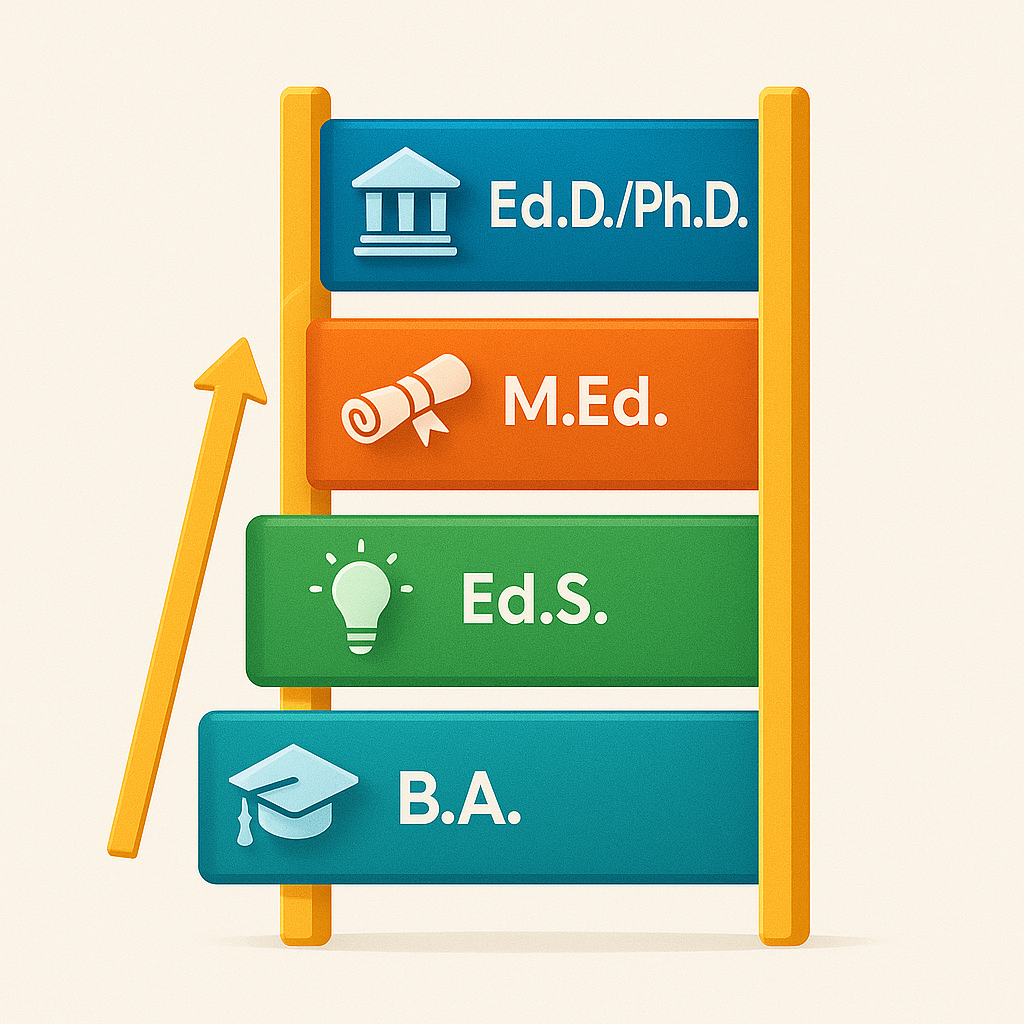
Day-to-Day Responsibilities of an Education Specialist
Education specialists are often the hidden engines behind a school’s academic excellence. Their daily responsibilities go far beyond the classroom—they operate across departments, support teachers, track data, intervene with struggling learners, and ensure legal and instructional standards are met.
While their exact workload depends on their area of specialization (e.g., curriculum, special education, EdTech, etc.), most education specialists balance three core pillars in their day-to-day work: instructional support, student performance intervention, and institutional compliance.
Instructional Support & Coaching
One of the most visible aspects of an education specialist’s role is working directly with educators to elevate instructional quality.
Typical responsibilities include:
- Collaborating with teachers to align lesson plans with state standards and learning outcomes
- Coaching educators on effective pedagogy, differentiation, and classroom management
- Leading professional development (PD) workshops on topics like Universal Design for Learning, culturally responsive instruction, or formative assessment strategies
- Reviewing and redesigning existing curriculum to improve engagement and effectiveness
- Introducing and training staff on instructional technology and data tools
In many districts, specialists become the go-to experts for mentoring new teachers or piloting innovative teaching models.
Data Analysis & Academic Intervention
Education specialists are often the analytical minds behind a school’s student achievement strategy.
Daily tasks may involve:
- Reviewing performance data (test scores, attendance, behavioral metrics) to spot achievement gaps
- Designing and overseeing Response to Intervention (RTI) or Multi-Tiered System of Supports (MTSS) strategies
- Providing direct support to struggling students, including those in special education or English Language Learner (ELL) programs
- Working closely with school psychologists, social workers, and counselors to build student success plans
- Monitoring progress and adjusting interventions as needed
By grounding their work in data, specialists ensure every student receives personalized, evidence-based support.
Policy Implementation & Compliance
Beyond teaching and learning, education specialists also play a crucial role in ensuring schools meet legal, financial, and policy requirements.
Their work may include:
- Overseeing implementation of IEPs (Individualized Education Programs) and 504 plans
- Ensuring compliance with federal laws such as IDEA, ESSA, Title I, and FERPA
- Preparing reports and evidence for state audits, accreditation reviews, or district-wide evaluations
- Writing grants for new programs or managing budgets for federal or state-funded initiatives
- Participating in school improvement planning, diversity/inclusion efforts, or strategic reform
Whether they’re working with administrators or advocacy teams, specialists act as a compliance safety net for school systems.
Key Skills Every Education Specialist Needs
- Instructional Design & Adult Learning Theory
- Data Analysis & Literacy
- Special Education Law (IDEA, Section 504)
- Culturally Responsive Teaching
- RTI/MTSS Frameworks
- Curriculum Alignment & Evaluation
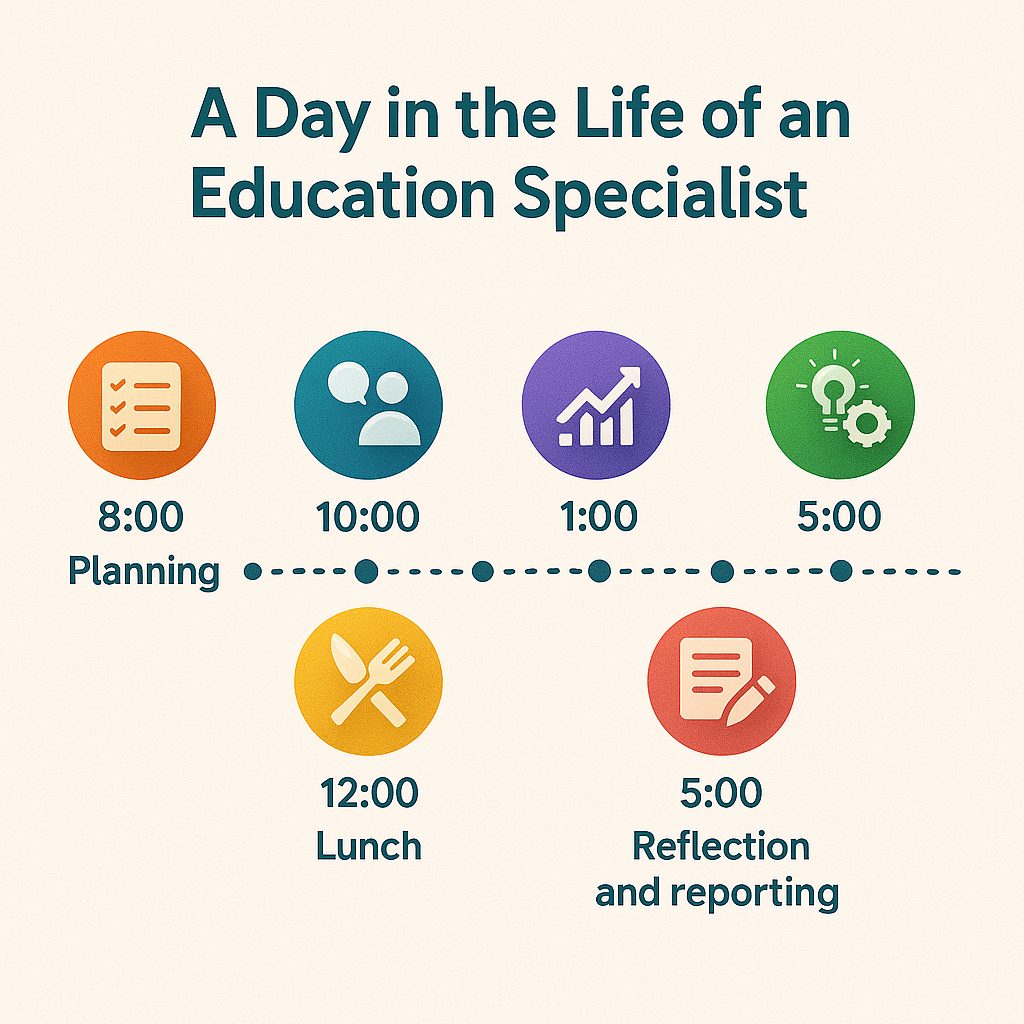
- 8:00 AM – Co-planning with a 10th-grade ELA teacher
- 10:00 AM – MTSS team meeting to review at-risk student data
- 12:00 PM – PD session on literacy strategies
- 2:00 PM – IEP compliance check-in with special ed department
- 3:30 PM – Review grant application drafts
Types of Education Specialists in the U.S.
Education specialist roles span a diverse range of instructional, developmental, and support-based careers—all focused on improving student outcomes and strengthening school systems. Depending on your interests, credentials, and background, the path you take can lead to specialized support services, leadership, or even policy reform.
Here’s a breakdown of the most common education specialist roles in the U.S.—including what they do, where they work, and what qualifications they usually require.
Special Education Specialist
Focus: Supporting students with disabilities under IDEA (Individuals with Disabilities Education Act)
- Designs and oversees Individualized Education Programs (IEPs)
- Works closely with classroom teachers, speech therapists, and occupational therapists
- Ensures legal compliance and adapts curriculum to meet accessibility needs
- Often certified with an Ed.S. in Special Education or related licensure
💡 Common Workplaces: Public schools, special education co-ops, private intervention centers
Instructional Coach / Curriculum Specialist
Focus: Improving classroom instruction and aligning curriculum with state standards
- Co-plans with teachers, models lessons, and provides feedback
- Analyzes student data to revise curriculum pacing and assessments
- Leads school-wide professional development (PD)
- Typically holds an Ed.S. in Curriculum & Instruction or a Master’s with experience
💡 Common Workplaces: K–12 districts, charter schools, education service agencies
School Psychologist
Focus: Student mental health, behavioral assessment, and crisis intervention
- Conducts psychological evaluations and writes reports
- Participates in eligibility meetings for SPED services
- Consults with families and staff on student well-being
- Requires a specialist-level degree (Ed.S.) in School Psychology and national certification (NCSP)
💡 Common Workplaces: Public schools, early intervention centers, private practice
ESL/ELL Specialist (English as a Second Language)
Focus: Supporting multilingual learners in English language acquisition
- Provides direct language instruction
- Assists teachers in modifying content for language access
- Supports families with translation and cultural adaptation
- Typically certified in ESL with state-specific endorsements
💡 Common Workplaces: Urban and diverse school districts, international schools, language academies
Also Visit:
How to Learn the Russian Language?
Early Childhood Education Specialist
Focus: Child development and foundational literacy/numeracy for ages 0–8
- Designs developmentally appropriate activities
- Trains staff in early childhood pedagogy and behavior management
- May oversee Head Start or Pre-K compliance
- Often holds an Ed.S. in Early Childhood Education or Child Development
💡 Common Workplaces: Preschools, Head Start programs, district early childhood departments
Educational Technology Specialist
Focus: Integrating digital tools and platforms into instruction
- Trains staff on tech tools (Google Classroom, Canvas, Edpuzzle, etc.)
- Advises on digital citizenship, 1:1 initiatives, and assistive tech
- Supports blended and remote learning environments
- Requires strong tech literacy and often an Ed.S. or Master’s in EdTech
💡 Common Workplaces: School districts, virtual academies, edtech companies
Reading Interventionist
Focus: Improving literacy outcomes for at-risk readers
- Delivers intensive reading interventions aligned with RTI frameworks
- Monitors student progress with diagnostic tools
- Coaches classroom teachers on phonics and comprehension strategies
- Usually holds a literacy specialist endorsement or Reading Recovery certification
💡 Common Workplaces: Elementary schools, literacy centers, after-school programs
Credentials You May Need (State-Specific)
| Role | Typical Credential | Additional Requirements |
|---|---|---|
| Special Education Specialist | Ed.S. or Master’s + SPED License | Praxis II, IEP law training |
| Instructional Coach | Ed.S. in Curriculum & Instruction | Teaching experience, district PD |
| School Psychologist | Ed.S. in School Psychology | NCSP, state licensing exam |
| ESL/ELL Specialist | ESL Endorsement or TESOL Certification | Language assessment experience |
| EdTech Specialist | Master’s or Ed.S. in EdTech | ISTE Certification (optional) |
| Reading Interventionist | Literacy Specialist Endorsement | Orton-Gillingham or similar training |
🔍 What are you most passionate about?
💻 Educational Technology
📱 Apps
👩🏫 Training
🏫 Early Childhood Learning
📚 Curriculum
🤝 One-on-one Support
🧩 Special Education
📝 Assessment
🛠 Program Design
🎓 Leadership & Admin
📜 Policy
🤝 People
Education Specialist Degrees & Certifications
Becoming an education specialist is a strategic path for educators seeking advanced expertise without committing to a full doctoral program. Whether you’re aiming to support struggling students, lead curriculum innovation, or bridge instructional gaps, earning an Education Specialist (Ed.S.) degree equips you with focused, practical skills that go beyond a Master’s.
Let’s break down the difference between degrees, certification paths by state, and what it really takes to become a certified education specialist in the U.S.
What Is an Ed.S. Degree?
The Education Specialist (Ed.S.) degree is a post-master’s program designed for experienced educators seeking deeper training in a specialized area of education—but who may not need or want to pursue a research-heavy doctorate (Ed.D. or Ph.D.).
Key Features of an Ed.S. Program:
- Credential Level: Sits between a Master’s and a Doctorate
- Credit Hours: Typically 30–36 post-master’s credit hours
- Duration: ~1.5 to 2 years (often fully online or hybrid)
- Dissertation: No dissertation required (though a capstone or practicum may be)
- Goal: Career advancement, licensure upgrade, or preparation for administrative or specialist roles
Common Fields of Ed.S. Study:
- School Psychology (one of the few roles where Ed.S. is the standard)
- Educational Leadership / Administration
- Curriculum & Instruction
- Special Education Leadership
- Instructional Technology
💡 Many districts view the Ed.S. as a terminal credential for leadership or consulting roles that don’t require full doctorates.
Certification Requirements (U.S. by State)
To practice as an education specialist in the U.S., you typically need more than just a degree—you also need state licensure or certification. These vary considerably by state and specialty.
Example Comparison: Florida vs. California
| Requirement | Florida | California |
|---|---|---|
| Degree Needed | Ed.S. or equivalent in area of specialization | Master’s or Ed.S. + approved credential program |
| Licensure Exam | Florida Educational Leadership Exam (FELE) | California Educator Credentialing Assessments (CECA) |
| Renewal Requirement | 120 hours of professional development every 5 years | 150 continuing education hours every 5 years |
| ESL/ELL Requirement | ESOL endorsement often required | CLAD Certificate or English Learner Authorization |
Other Certification Considerations:
- Specialized Endorsements: For reading specialists, ESL, SPED, etc.
- Background Checks & Fingerprinting: Required in all states
- Practicum or Internship: For roles like school psychology or SPED coordinator
- National Certifications: Such as NCSP (Nationally Certified School Psychologist)
Top U.S. Universities Offering Ed.S. Degrees
(According to U.S. News, NCES, and institutional data)
- University of Florida – Ed.S. in Curriculum & Instruction (Online)
- Vanderbilt University – Ed.S. in Learning and Design
- University of Minnesota – Ed.S. in Educational Administration
- Ball State University – Ed.S. in School Psychology
- Liberty University – Online Ed.S. in Educational Leadership
- University of Nebraska – Ed.S. in Higher Education Administration
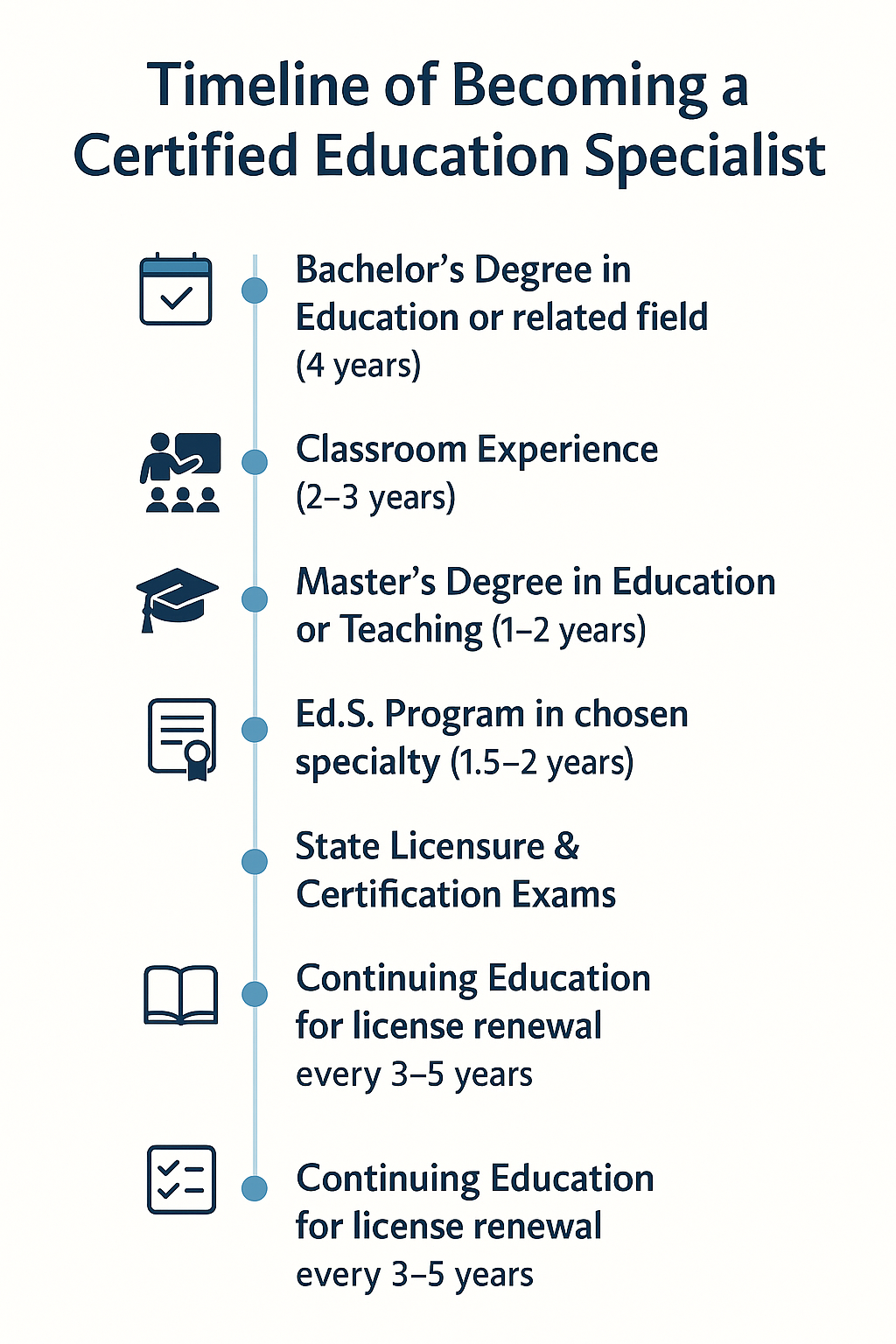
Salary & Job Outlook for Education Specialists in the U.S.
Education specialists bring deep pedagogical expertise to school systems—and it pays off. Whether you’re transitioning from classroom teaching or moving laterally within education services, becoming an education specialist often leads to higher earnings, more autonomy, and access to leadership pathways.
Here’s a breakdown of salary ranges, job demand, and where education specialists are thriving most.
Average Salary for Education Specialists
According to the U.S. Bureau of Labor Statistics (BLS) and NCES data, the average salary for education specialists ranges from $65,000 to $95,000 per year, depending on:
- Specialization (e.g., school psychology pays more than ESL)
- Geographic region (urban and suburban districts typically pay higher)
- Level of experience (entry-level vs. seasoned coach or administrator)
- Certifications and advanced degrees (holding an Ed.S. often boosts salary tier)
“In my first year as an instructional specialist, I earned 20% more than I did teaching full-time—and had a seat at the leadership table.
Top-Paying Education Specialist Roles
“Top 5 Highest Paying Education Specialist Roles in 2025”
| Role | Median Annual Salary (U.S.) |
|---|---|
| School Psychologist | $87,550 |
| Instructional Coordinator | $80,560 |
| Special Education Compliance Lead | $78,420 |
| Reading/Literacy Specialist | $75,310 |
| Curriculum Designer (EdTech) | $92,000 (private sector) |
These numbers reflect both public and private sector roles and can increase in states with teacher shortages or high cost-of-living allowances (e.g., California, New York, Washington D.C.).
Job Growth & Demand Forecast (2025–2032)
The demand for qualified education specialists continues to rise, with projected growth between 7% and 9% through 2032, according to BLS projections. Several factors contribute to this:
- Expanded state mandates for early intervention, SPED compliance, and MTSS frameworks
- Digital learning growth demanding tech-integrated curriculum design
- Shortage of certified school psychologists in many districts
- More data-driven instruction requiring expertise in educational analytics
This growth outpaces many other occupations in education and makes the Ed.S. degree increasingly valuable as a credential.
Common Work Settings for Education Specialists
Education specialists are highly flexible professionals who can work across public, private, and nonprofit sectors:
- K–12 Public School Districts (most common)
- Charter School Networks & Private Schools
- State Departments of Education & Policy Units
- Online Education Companies (EdTech startups)
- Colleges & Teacher Prep Programs
- Independent Consulting or Grant-Funded Projects
Professionals who transition into curriculum design, instructional tech, or leadership training in private-sector roles may exceed six-figure salaries—especially with cross-disciplinary expertise.
Is Becoming an Education Specialist Worth It? [Pros & Cons]
Deciding to pursue an Education Specialist (Ed.S.) degree is a major career move—and one that requires clarity about both the opportunities and limitations of this mid-tier credential. For many educators, it represents the ideal balance: more depth than a Master’s without the commitment of a full doctoral program.
So, is it worth it? Here’s a no-fluff breakdown.
✅ Pros of Earning an Ed.S. Degree
- Higher Salary Potential
Most Ed.S. graduates report a 10–25% salary increase over their prior teaching role, especially in leadership or support specialist positions. - Deeper Specialization Without a Ph.D.
Focused coursework in curriculum design, school psychology, or SPED allows you to become an expert in your field without years of doctoral research. - Job Stability & Administrative Track Access
Ed.S. credentials can qualify you for district-level leadership, instructional coaching, and roles previously reserved for Ed.D. holders. - State Licensure Upgrade
In many states, the Ed.S. meets requirements for advanced certification, often leading to tenure-track positions or eligibility for state leadership exams.
❌ Cons of the Ed.S. Path
- Time Commitment (12–24 Months)
Even without a dissertation, the Ed.S. is still a rigorous academic path with capstones, internships, or practicums. - Requires Prior Experience
Most programs assume 3–5 years of classroom teaching experience, so it’s not ideal for new graduates. - Limited Role Mobility Without District-Level Connections
Advancement sometimes hinges on who you know—especially in public systems with long-tenured leadership teams.
Who Should Choose the Ed.S. Path
This degree is ideal for:
- Veteran teachers seeking school leadership or curriculum roles
- Professionals targeting specialist positions in SPED, literacy, or tech
- Those who want career advancement without pursuing a full doctorate
- Educators planning to stay within the K–12 system
It’s less ideal for those aiming for university faculty or pure academic research, where a Ph.D. or Ed.D. may be more appropriate.
FAQs About Education Specialists
How much do education specialists make in the US?
→ Average salary ranges between $70,000 and $90,000 per year. High-demand roles like school psychologists and SPED compliance leads can earn over $100,000.
What is specialisation in education?
→ Specialisation refers to focused study in a specific discipline such as literacy, mathematics, educational leadership, curriculum development, or special education (SPED).
What is the highest paid job in education?
→ Superintendents, school psychologists, and district-level directors rank among the top-paid professionals in the education field.
Which specialists make the most money?
→ Roles like SPED coordinators, educational technology directors, and licensed school psychologists command the highest salaries among education specialists.
Which education has the highest salary?
→ Professionals with doctoral degrees (Ed.D. or Ph.D.) typically earn the highest salaries, especially in university-level roles or policy leadership.
What is the salary of a lecturer in America?
→ Varies by institution and state; most U.S. lecturers earn between $60,000 and $95,000 per year, with higher salaries at research universities.
Is teaching job in demand in the USA?
→ Yes. Teachers are in high demand, particularly in STEM, Special Education, ESL, and rural/urban districts facing staff shortages.
What is the highest paid teacher in the USA?
→ Veteran teachers in New York City or California can earn $100,000+ annually, especially with advanced credentials and longevity bonuses.
What is the highest salary for Teach for America?
→ Teach for America (TFA) salaries vary by placement region but typically range from $33,000 to $58,000 per year, plus relocation and education stipends.
Final Thoughts: Is the Education Specialist Path Right for You?
Choosing to become an Education Specialist isn’t just a career move—it’s a mindset shift. It’s about stepping beyond the walls of your own classroom and influencing the system as a whole.
Who Is This Path Best For?
This role is especially suited to:
- Mid-career educators seeking more influence without leaving K–12 entirely
- Career changers with a background in psychology, tech, or curriculum
- Aspiring leaders who want to shape policy, design instructional strategy, or support diverse learners without pursuing a full doctorate
If you’ve ever asked yourself, “How can I make a bigger impact without burning out?”, the Ed.S. path may be your answer.
The Value Proposition: More Than a Pay Bump
While the salary bump is real—often 10–25% over teaching—the long-term value of becoming an education specialist lies in:
- Autonomy in decision-making
- Respect across faculty and district leadership
- Opportunities for creative influence in curriculum, compliance, or innovation
You’re no longer executing someone else’s plan—you’re designing it.
📘 Actionable Advice:
If you’re considering this path, take the following next steps:
- Observe a working education specialist at your school or district office
- Find a mentor with an Ed.S. or similar leadership credential
- Explore prep programs, either online or hybrid, that align with your interest area (SPED, Curriculum, Leadership, etc.)
